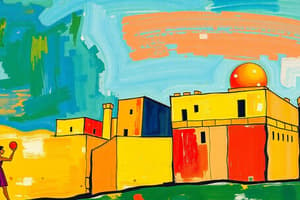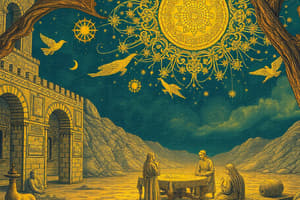Podcast
Questions and Answers
What was a significant contribution of Herod the Great?
What was a significant contribution of Herod the Great?
- He built the First Temple.
- He created the Jewish dietary laws.
- He expanded the Second Temple in Jerusalem. (correct)
- He led the Maccabean Revolt.
Which of the following describes kosher food?
Which of the following describes kosher food?
- Food that is exclusively vegetarian.
- Food that conforms to Jewish dietary laws. (correct)
- Any food served at a Jewish festival.
- Food prepared by a rabbi.
What age marks the Bar Mitzvah initiation for boys?
What age marks the Bar Mitzvah initiation for boys?
- 12 years old.
- 13 years old. (correct)
- 14 years old.
- 15 years old.
On what day is Yom Kippur observed?
On what day is Yom Kippur observed?
What is the central purpose of a synagogue?
What is the central purpose of a synagogue?
What event does the Arch of Titus commemorate?
What event does the Arch of Titus commemorate?
Which of these historical figures was known for oppressive policies against Judaism?
Which of these historical figures was known for oppressive policies against Judaism?
What does the Western Wall represent?
What does the Western Wall represent?
What ancient region is roughly equivalent to modern-day Israel, Palestine, Lebanon, and parts of Syria and Jordan?
What ancient region is roughly equivalent to modern-day Israel, Palestine, Lebanon, and parts of Syria and Jordan?
Which artifact contains the earliest known mention of 'Israel' outside the Bible?
Which artifact contains the earliest known mention of 'Israel' outside the Bible?
Who is considered the patriarch of the Jewish people and is said to have traveled to Canaan?
Who is considered the patriarch of the Jewish people and is said to have traveled to Canaan?
In which ancient city mentioned in the Bible was a significant site during the Israelites' conquest of Canaan?
In which ancient city mentioned in the Bible was a significant site during the Israelites' conquest of Canaan?
What does the tetragrammaton YHWH represent in Hebrew scripture?
What does the tetragrammaton YHWH represent in Hebrew scripture?
What is the Hebrew Bible known as?
What is the Hebrew Bible known as?
Which artifact provides external evidence for the biblical King David?
Which artifact provides external evidence for the biblical King David?
What collection of texts discovered near the Dead Sea includes parts of the Hebrew Bible?
What collection of texts discovered near the Dead Sea includes parts of the Hebrew Bible?
What does the nine-branched menorah symbolize?
What does the nine-branched menorah symbolize?
Which holiday commemorates the giving of the Torah?
Which holiday commemorates the giving of the Torah?
What historical event does Passover commemorate?
What historical event does Passover commemorate?
What is a defining characteristic of Orthodox Judaism?
What is a defining characteristic of Orthodox Judaism?
What does the term Sephardim refer to?
What does the term Sephardim refer to?
What describes the Jewish Enlightenment?
What describes the Jewish Enlightenment?
What does the term Diaspora refer to?
What does the term Diaspora refer to?
What historical event is associated with Bar Kochba?
What historical event is associated with Bar Kochba?
Flashcards
Canaan
Canaan
An ancient region in the Eastern Mediterranean, encompassing modern-day Israel, Palestine, Lebanon, parts of Syria and Jordan. It was the Promised Land given to Abraham's descendants according to the Hebrew Bible.
Merneptah Stele
Merneptah Stele
An Egyptian stone tablet from around 1207 BCE, containing the earliest non-biblical reference to "Israel" as a people or tribe residing in Canaan.
Jericho
Jericho
One of the oldest continuously inhabited cities in the world, located in the West Bank. It's mentioned in the Bible as a significant site in the Israelites' conquest of Canaan.
YHWH
YHWH
Signup and view all the flashcards
Abraham's Journey
Abraham's Journey
Signup and view all the flashcards
Moses
Moses
Signup and view all the flashcards
The Tanakh
The Tanakh
Signup and view all the flashcards
Moabite Stele
Moabite Stele
Signup and view all the flashcards
Herod the Great
Herod the Great
Signup and view all the flashcards
Bar/Bat Mitzvah
Bar/Bat Mitzvah
Signup and view all the flashcards
Shabbat
Shabbat
Signup and view all the flashcards
Yom Kippur
Yom Kippur
Signup and view all the flashcards
Synagogue
Synagogue
Signup and view all the flashcards
1st/2nd Temple of Jerusalem
1st/2nd Temple of Jerusalem
Signup and view all the flashcards
Ark of the Covenant
Ark of the Covenant
Signup and view all the flashcards
Menorah
Menorah
Signup and view all the flashcards
Passover
Passover
Signup and view all the flashcards
Rosh Hashanah
Rosh Hashanah
Signup and view all the flashcards
Diaspora
Diaspora
Signup and view all the flashcards
Bar Kochba
Bar Kochba
Signup and view all the flashcards
Anti-Semitism
Anti-Semitism
Signup and view all the flashcards
Holocaust
Holocaust
Signup and view all the flashcards
Study Notes
Canaan
- An ancient region in the Eastern Mediterranean, roughly corresponding to modern-day Israel, Palestine, Lebanon, and parts of Syria and Jordan.
- Considered the Promised Land by Jewish people.
Merneptah Stele
- A stone tablet from ancient Egypt (circa 1207 BCE).
- Contains the earliest known mention of "Israel" outside the Bible.
- Refers to Israel as a people or tribe in Canaan.
Jericho
- One of the oldest continuously inhabited cities in the world.
- Located in the West Bank.
- Mentioned in the Bible as a significant Israelite conquest site in Canaan.
YHWH
- The tetragrammaton, representing the name of God in Hebrew scripture.
- Often written as "Yahweh" or "Jehovah".
- Considered the most sacred name for God in Judaism.
Abraham's Journey
- Abraham, the patriarch of the Jewish people, is believed to have travelled from Ur to Canaan.
- This journey is considered foundational to the Jewish narrative.
- He was commanded by God to make the journey.
Moses
- A prophet and leader in Judaism.
- Led the Israelites out of slavery in Egypt.
- Received the Ten Commandments from God.
- Guided the Israelites through the wilderness for 40 years before reaching the Promised Land.
The Tanakh
- The canonical collection of Jewish texts, also known as the Hebrew Bible.
- Composed of three parts: Torah (Law), Nevi'im (Prophets), and Ketuvim (Writings).
Moabite Stele
- An ancient stone inscription (9th century BCE).
- Describes the victories of Moabite king Mesha.
- Mentions the "House of David," providing external evidence for the biblical King David.
Tel Dan Stele
- A fragmentary inscribed stone (9th century BCE).
- Contains mentions of the "House of David", which offers an external reference to King David.
Cyrus Cylinder
- A Persian artifact (6th century BCE).
- Records King Cyrus the Great's conquest of Babylon.
- Allowed exiled peoples (including Jews) to return to their homeland.
Dead Sea Scrolls
- A collection of Jewish texts (2nd century BCE – 1st century CE).
- Discovered near the Dead Sea.
- Includes parts of the Hebrew Bible and other religious writings.
Herod the Great
- A Roman client king of Judea (37 BCE – 4 BCE).
- Known for extensive building projects, including expansion of the Second Temple in Jerusalem.
- His name also appears in the biblical story of the Massacre of the Innocents.
Kosher
- Refers to food that conforms to Jewish dietary laws.
- Involves rules about types of food (e.g. prohibiting pork).
- Includes preparation methods and serving regulations.
Bar/Bat Mitzvah
- A Jewish coming-of-age ceremony.
- Marks the responsibility for following Jewish commandments when reaching the age of 13 (Bar Mitzvah) or 12 (Bat Mitzvah).
Shabbat
- The Jewish Sabbath.
- Observed from Friday evening to Saturday evening.
- A day of rest and worship in accordance with the Fourth Commandment.
Yom Kippur
- The Day of Atonement, the holiest day of the Jewish year.
- Observed with fasting, prayer, and repentance.
- Marks the conclusion of the Ten Days of Repentance.
Synagogue
- A Jewish house of worship, prayer, and community gathering.
- A central element of Jewish religious life, especially during the diaspora.
1st/2nd Temple of Jerusalem
- The First Temple, built by King Solomon, was destroyed in 586 BCE by the Babylonians.
- The Second Temple was rebuilt in the 5th century BCE and destroyed in 70 CE by the Romans.
Ark of the Covenant
- A sacred chest that held the tablets of the Ten Commandments.
- Carried by the Israelites during their desert wanderings.
Arch of Titus
- A Roman triumphal arch (82 CE).
- Erected to commemorate the Roman victory in the Jewish War and the destruction of the Second Temple in Jerusalem.
Western Wall
- A remnant of the Second Temple, located in Jerusalem.
- Considered the holiest site in Judaism for prayer and pilgrimage.
Hanukkah
- A Jewish festival lasting eight days, celebrating the rededication of the Second Temple.
- Commemorates the miracle of the oil.
Antiochus IV
- A Greek king of the Seleucid Empire.
- His oppressive policies led to the Maccabean Revolt.
- His policies encouraged oppression of Jewish practices leading to rebellion.
Maccabean Revolt
- A Jewish rebellion (167-160 BCE).
- Led by the Maccabee family.
- Resulted in the establishment of the Hasmonean dynasty and Jewish independence.
Menorah
- A seven-branched candelabrum used in the ancient Temple in Jerusalem.
- Symbolizes Judaism.
- The nine-branched menorah is used during Hanukkah.
Passover
- A Jewish holiday commemorating the Exodus from Egypt.
- Involves a special meal (Seder).
- Eating of unleavened bread (matzah).
Shavuot
- A Jewish holiday celebrating the giving of the Torah at Mount Sinai.
- Celebrates the end of the grain harvest (particularly wheat harvest).
Rosh Hashanah
- The Jewish New Year, marking the beginning of the Ten Days of Repentance.
- A time for reflection, prayer, and self-examination.
Diaspora
- The dispersion of Jews beyond Israel, particularly after destruction of the Second Temple.
- Their communities scattered across the world.
Bar Kochba
- A Jewish leader who led a revolt against the Roman Empire (132-136 CE).
- The revolt failed, ending Jewish independence in Judea for nearly two millennia.
Syria-Palestina
- A Roman province established after the Bar Kochba revolt.
- Incorporated Judea and surrounding areas.
Ashkenazim
- Jews of Central and Eastern European origin.
- The term is derived from "Ashkenaz," a medieval Hebrew name for Germany.
Sephardim
- Jews originally from Spain, Portugal, and parts of North Africa and the Middle East.
- Their traditions and customs are distinct from Ashkenazi Jews.
Jewish Enlightenment
- A movement in the 18th and 19th centuries.
- Sought to modernize Jewish thought and integrate Jews more fully into European society.
- Often associated with figures like Moses Mendelssohn.
Orthodox Judaism
- A traditionalist branch of Judaism.
- Holds strictly to Jewish law and customs, resisting modern interpretations or innovations.
Conservative Judaism
- A branch of Judaism that seeks to conserve Jewish traditions.
- While allowing for some modernization and interpretation of Jewish law.
Reform Judaism
- A more liberal branch of Judaism.
- Emphasizes individual choice in interpreting Jewish law.
- Adapts Jewish practices to modern life.
Anti-Semitism
- Prejudice, discrimination, or hostility against Jews.
- Has existed for centuries leading to significant suffering.
Holocaust
- The systematic persecution and murder of six million Jews by Nazi Germany during World War II.
Zionism
- The political movement advocating for the establishment of a Jewish homeland in Palestine.
- Led to the founding of the modern State of Israel.
Israel-Palestine Conflict
- A long-standing geopolitical conflict between Israelis and Palestinians.
- Primarily over territorial claims and political sovereignty.
Modern State of Israel
- A country established in 1948 as a homeland for the Jewish people.
- Following the end of the British Mandate and the UN partition plan.
- Located in the historical land of Israel and Palestine.
Studying That Suits You
Use AI to generate personalized quizzes and flashcards to suit your learning preferences.




